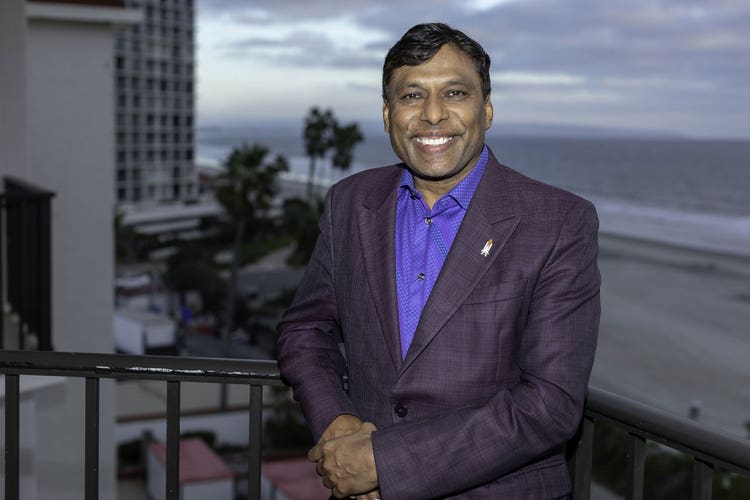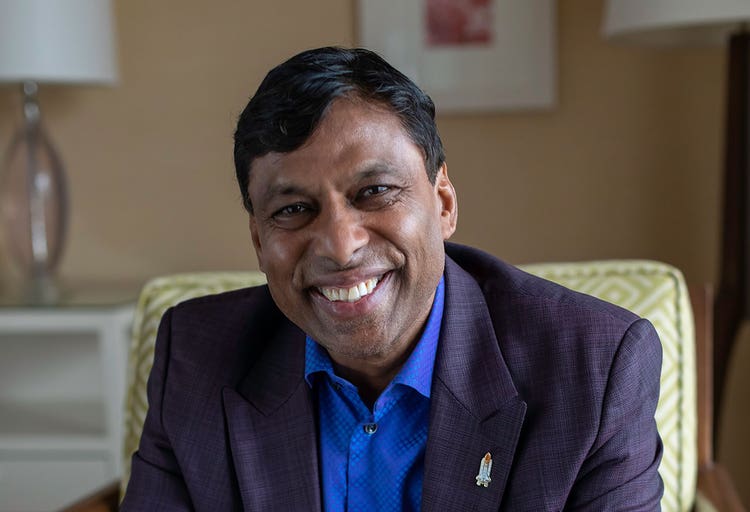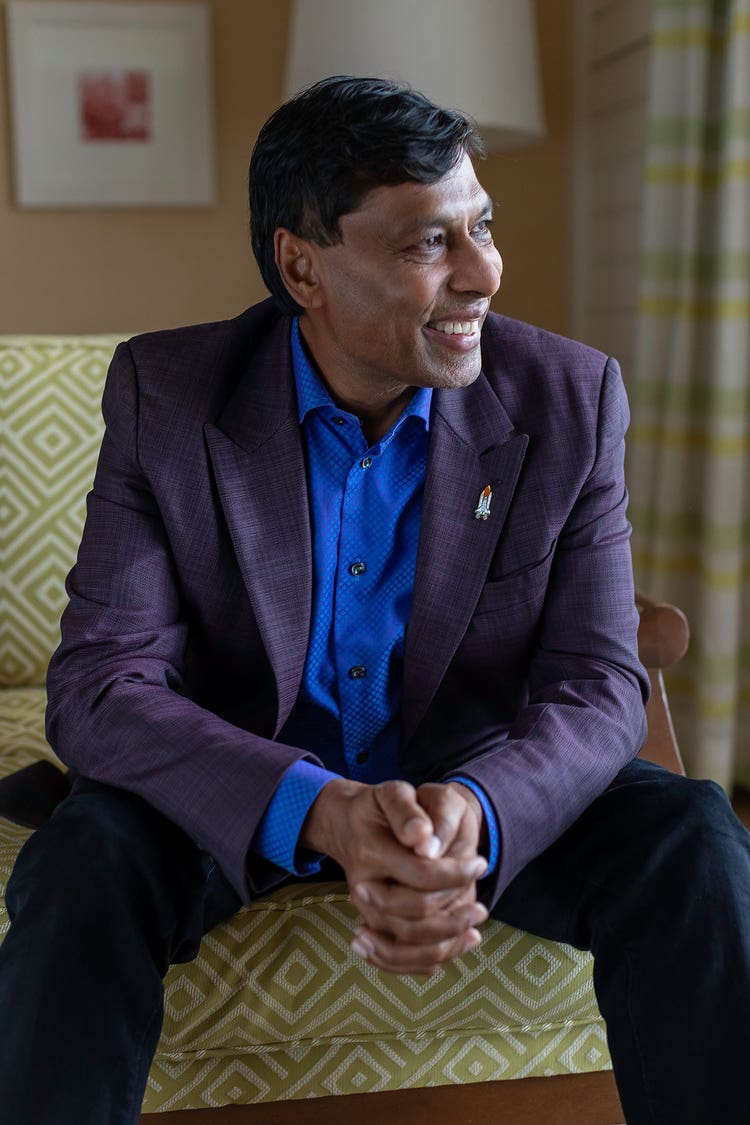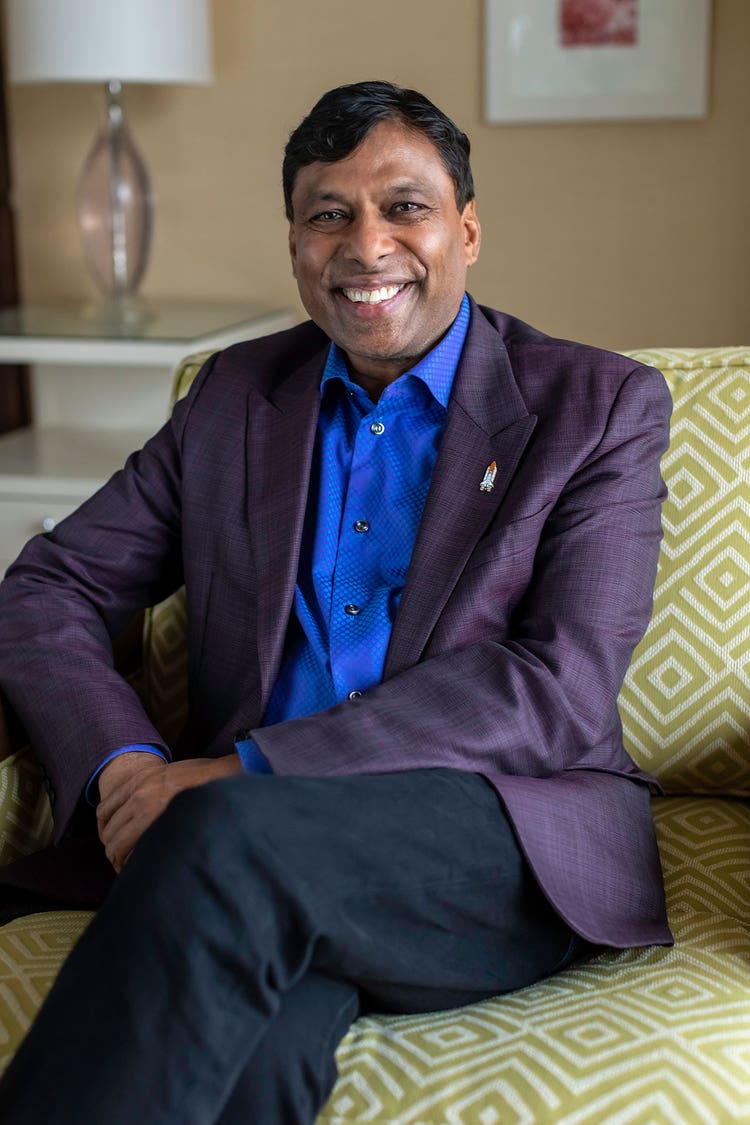Naveen Jain Says the Sky Is Not the Limit, When It Comes to Well-being

“The only thing that can limit what we can achieve is our imagination.” —Naveen Jain
Tech entrepreneur Naveen Jain has taken on some of the world’s biggest challenges—from improving public health and education to future space colonization—by imagining the changes he’d like to see and coming up with solutions so audacious they could “fundamentally change who we are as humans.” These mankind-advancing missions are what Jain refers to as his “moonshots.”
In his new book of the same name, Jain, founder of Moon Express and gut-mapping company Viome, says that despite depressing headlines and divisive politics, there’s plenty of reason for hope and excitement about the future and our own human potential if we can just push past our self-limiting thoughts and dream bigger about what we’d like to create.
“There’s never been a time in human history,” Jain says, “where individuals … are capable of doing things that only the nation-states or superpowers did. Once you change people’s thought processes of what is possible, it just takes one person … one person to move humanity forward.”
Making disease optional

One of Jain’s recent moonshots is thriving: His company Viome is tackling the pharmaceutically driven approach to health care, which focuses on suppressing symptoms of chronic disease from autoimmune conditions to Alzheimer’s to cancer rather than addressing the cause.
“Every one of these chronic diseases has one root cause, which is chronic inflammation,” Jain says, “and the chronic inflammation happens because your gut is imbalanced.”
The immune system is our sixth sense, Jain says. “It is a complex network of cells that is designed to interact with the outside world and determine if what the body is coming in contact with is a friend or a foe.” From Jain’s perspective, using the term “immune system” doesn’t really define what this system does very well: “It is an environmental surveillance system that is most commonly interacting with microbes. It should have been called the ‘microbial interaction system.’”
Because 70 percent of our immune system is in our gut lining, Jain says we need to be better hosts to the 40 trillion bacterial cells in our microbiome that interact with this tissue to achieve greater wellness and disease prevention.
“Our immune system is being trained by these microorganisms,” Jain says, “and that’s what starts to cause the inflammation.” That inflammation, he contends, can trigger everything from diabetes to depression, as well as signs of aging, as our microbiome communicates with our mitochondria and the gene expression changes.
Jain says he believes that “someday we will realize that aging is just another chronic disease and [that] we’ll be able to reverse and prevent aging. And it’s all going to come down to keeping your microbiome healthy.”
Jain’s company Viome leverages technology that was developed for national security purposes at Los Alamos National Laboratory to analyze individuals’ microbiome through a stool sample. Viome maps your bacterial makeup and the substances these organisms are producing to help make on-target dietary recommendations that support a healthier life.
Many foods that are commonly thought of as healthy such as spinach may actually be doing a certain subset of people harm.
“Spinach has oxalic acid,” he says. “And many of us don’t have the microbiome to be able to detoxify oxalic acid. … Even things like pomegranate juice are not healthy for everyone. There is no such thing as a universally healthy diet.”
Developing a mindset to reach the moon and stars
In essence, Jain says, we as individuals are not a set of characteristics inherited from our mothers and fathers with a static set of limitations, but rather we are a “dynamic entity” that is capable of more than we could imagine with the right assist from our microbiome and mindset.
“We’re just conditioned to think small,” Jain says. Most of us, he explains, believe that other people are going to take care of mankind’s biggest problems—from eliminating chronic disease to finding a future colony in space for Earth’s citizens should a global catastrophe strike.
Tackling seemingly insurmountable goals has to begin, Jain says, with the premise that anything is possible. Even the most complex problems can be solved working backward from the future you imagine to the present day, breaking each hurdle down before tackling the next.
Take, for instance, life on the moon. Most people would argue that it’s not possible because of the radiation and issues with gravity, temperature and growing food. But, Jain says, if you tackle it one step at a time, starting with the radiation, you can ultimately find an answer.
Already, Jain says, there are bacterial species that have been found growing in radioactive waste. “What that means is that somehow nature has figured out how to protect its DNA from extremely high radiation and use the radiation as a source of energy.”
What if we could apply this genetic material using gene-editing technology to modify human beings so we’re also radiation-resistant? It may not happen in the next several years, but Jain adds that there’s no reason we couldn’t do that in the years ahead.
Similarly, Jain posits, instead of worrying about how to grow the food on the moon, we should focus on satisfying the need for why humans need food, which happens to be for energy and nutrients. What if we can draw nutrients from water on the poles of the moon and use radiation as a source of energy. We need to focus on the possibilities. We can’t look at the world as is but really imagine what we want the world to be and dedicate our lives to creating that world.
Jain’s company Moon Express—the first private company to get government approval to go beyond the Earth’s orbit—is already planning to use robotic lunar landers to mine and transport helium-3, a rare nonradioactive isotope, back from the moon to use in years ahead for nuclear fusion, a clean source of energy.

Flipping the paradigm
One of the biggest stumbling blocks to moonshot thinking is our scarcity mindset, Jain adds, or our predisposition to think that the only things of value in this world are things that are scarce, such as diamonds, rare paintings or fossil fuels.
“We fight over land. We fight over water. We fight over energy. … What is one thing we never fight over? Air. Oxygen,” he says. “Seventy thousand or 80,000 of us could sit in a stadium and enjoy a game. No one slaps the person sitting next to them and says, ‘Hey, you’re breathing my air.’”
Air is abundant, it’s available to everyone and it’s free. Now, he says, imagine if our main source of energy was as abundant as air.
“Every 90 minutes, more solar energy falls on our planet than we use in a whole year,” Jain says. If we can convert that in the next decade into energy we can all use, it can be as democratized and free as the air that we breathe.
“Imagine if you have free energy,” he says. “Even the dirtiest water in Africa can be distilled because you have free energy. … You can have clean, fresh water. … There’s no problem that we can’t solve with technology and entrepreneurship.”
Cultivating a mindset of possibility

One of the reasons Jain says that we aren’t moving forward more quickly as a society is our outdated education system, which still teaches facts and skills. Skills, he argues, can become obsolete very quickly in an age of exponential technology. Instead, we should be teaching students how to learn and solve problems collaboratively.
Facts and skills are readily available online. What’s really going to move the needle for humanity, Jain says, is when more “nonexperts” attempt to solve Earth’s big problems by challenging the foundations of everything that experts in each field have taken for granted.
Indeed, Jain says, too many entrepreneurs focus on the “how” of their dream at the beginning rather than asking the “what if” and “why” questions that usher in innovation.
If your idea sounds a little like science fiction, Jain says, you know that you’re on the right track.
“Dream so big that people think you’re crazy, and never be afraid to fail. And always stay intellectually curious.” —Naveen Jain
Society doesn’t encourage people to be dreamers, he says, and that makes us too dependent on others. Similarly, he explains, most people are too afraid of failure—afraid of what their friends, family and co-workers will say about their plans. But to Jain, an entrepreneur never truly fails until he gives up.
“Everything else is just simply a hiccup,” he says.
Successful entrepreneurs stay focused in pursuit of their goal without caring about others’ approval, Jain explains. They are obsessed with their mission. It’s what they stand for, what they get up thinking about every morning, and what they expect to be their contribution in this lifetime.
That might sound overwhelming, but Jain says it’s just a matter of setting small goals in pursuit of your dream. Each time you achieve one, he says, you mark it down as a win.
“That gives you the confidence to take the next step,” Jain says, “and the next thing you know you’re walking, the next thing you know you’re running, the next thing you know you’re flying … quite possibly to the moon.”
Video/Photo credit: Todd Cribari, inspirostudio.com
Grooming: Chanel